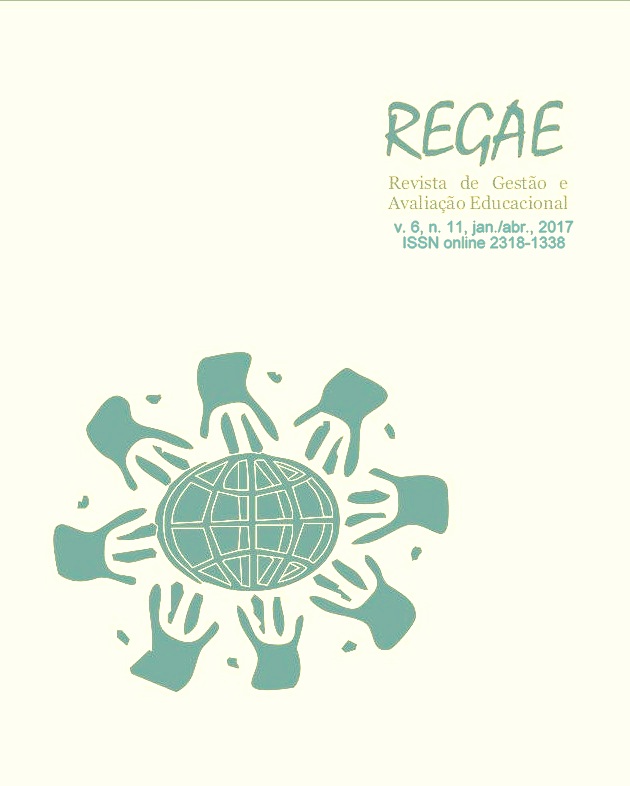Formation Pnaic: repercussions in the management of pedagogical practices
DOI:
https://doi.org/10.5902/2318133824557Abstract
This article is an excerpt Monograph work Specialization in Educational Management addresses the process of training of teachers of the National Pact for Literacy in Certain Age - Pnaic -, emphasizing public policies that promote this program in order to qualify school practices. It aims to analyze the experiences of teachers of municipal Uruguaiana/RS, from its formation in Pnaic and contributions to education, considering the activities developed by them in the daily routine of their professional actions. It follows from the events resulting from the formation process of Pnaic was gestated significantly and contributed to the pedagogical practices of teachers, thus presenting indicators for the legitimacy of public policies and national education quality.
Key-words: public policy, teacher training, management, teaching practices.
Downloads
References
BOLZAN, Doris. Leitura e escrita: ensaios sobre alfabetização. Santa Maria: UFSM, 2007.
BRASIL. Pacto nacional pela alfabetização na idade certa. Brasília: Ministério da Educação, 2012.
BRASIL. Medida provisória n. 586, de 8 de novembro de 2012. Pacto Nacional pela Alfabetização na Idade Certa. Brasília: Ministério da Educação, 2012. Disponível em <http://pacto.mec.gov.br/images/pdf/mp_586_pacto.pdf >. Acesso em 9 nov. 2014.
BRASIL. Lei n. 11.273, de 6 de fevereiro de 2006. Pacto Nacional pela Alfabetização na Idade Certa. Brasília: Ministério da Educação. 2012. Disponível em <http://pacto.mec.gov.br/images/pdf/Lei%20de%20Bolsas%20n%2011%20273.pdf>. Acesso em 9 nov. 2014.
DOURADO, L. F. Políticas e gestão da educação básica no Brasil: limites e perspectivas. 2007. Disponível em <http://www.cedes.unicamp.br>. Acesso em 12 nov. 2015.
FREIRE, Paulo. Política e educação. São Paulo: Cortez. 2001
GADOTTI, Moacir. Dimensão política do projeto pedagógico da escola. In: MINAS GERAIS. Projeto político pedagógico da escola. Belo Horizonte: SEE-MG, 2001.
KRAEMER, Maria Luiza. Lendo, brincando e aprendendo. Campinas: Autores Associados. 2007.
LIBÂNEO, José Carlos. Organização e gestão da escola: teoria e prática. Goiânia: Alternativa, 2004.
LIBÂNEO, José Carlos; OLIVEIRA, João Ferreira; TOSCHI, Mirza Seabra. Educação escolar: políticas, estrutura e organização. São Paulo: Cortez, 2008.
LÜCK, Heloísa. A gestão participativa na escola. Petrópolis: Vozes, 2006.
LÜCK, Heloísa. Concepções e processos democráticos de gestão educacional. Petrópolis: Vozes, 2008.
MERRIAM, S. B. Qualitative research and case study applications in education. San Francisco: Jossey-Bass, 1998.
MOYLES, Janet. Só brincar? O papel do brincar na educação infantil. Porto Alegre: Artemed, 2002.
SANTOS, Simone Cardoso dos. A importância do lúdico no processo ensino e aprendizagem. Santa Maria: UFSM, 2010.
SARTURI, Rosane C. Relatório do projeto estabelecendo uma relação dialética entre os saberes e as práticas nos anos iniciais do ensino fundamental: em busca de um currículo permeado pela qualificação do processo ensino- aprendizagem. Santa Maria: UFSM, 2010.
SEVERINO, Antonio J. Metodologia do trabalho científico. São Paulo: Cortez, 2007.
TRIVIÑOS, AUGUSTO NIBALDO SILVA. Introdução à pesquisa em ciências sociais: a pesquisa qualitativa em educação. São Paulo: Atlas. 1987.
YIN, Robert. Estudo de caso: planejamento e métodos. Porto Alegre: Bookman. 2001.
Downloads
Published
How to Cite
Issue
Section
License
Authors keep copyright and concede to the magazine the right of first publication, with the work simultaneously licensed under the Creative Commons Attribution 4.0 International, non-commercial license with no derivative work, which allows to share the work with no author recognition and initial publication in this magazine.
Authors has authorization to overtake additional contracts separately, to distribute a non-exclusive version of the work published in this magazine: For example: to publish in an institutional repository or as a chapter of a book, with authorial recognition and initial publication in this magazine.
Authors are allowed and are encouraged to publish and distribute their work online. For example: in institutional repositories or in their own personal page – at any point before or during the editorial process, because this can result in productive changes, as well as increase the impact and the mention to the published work.






